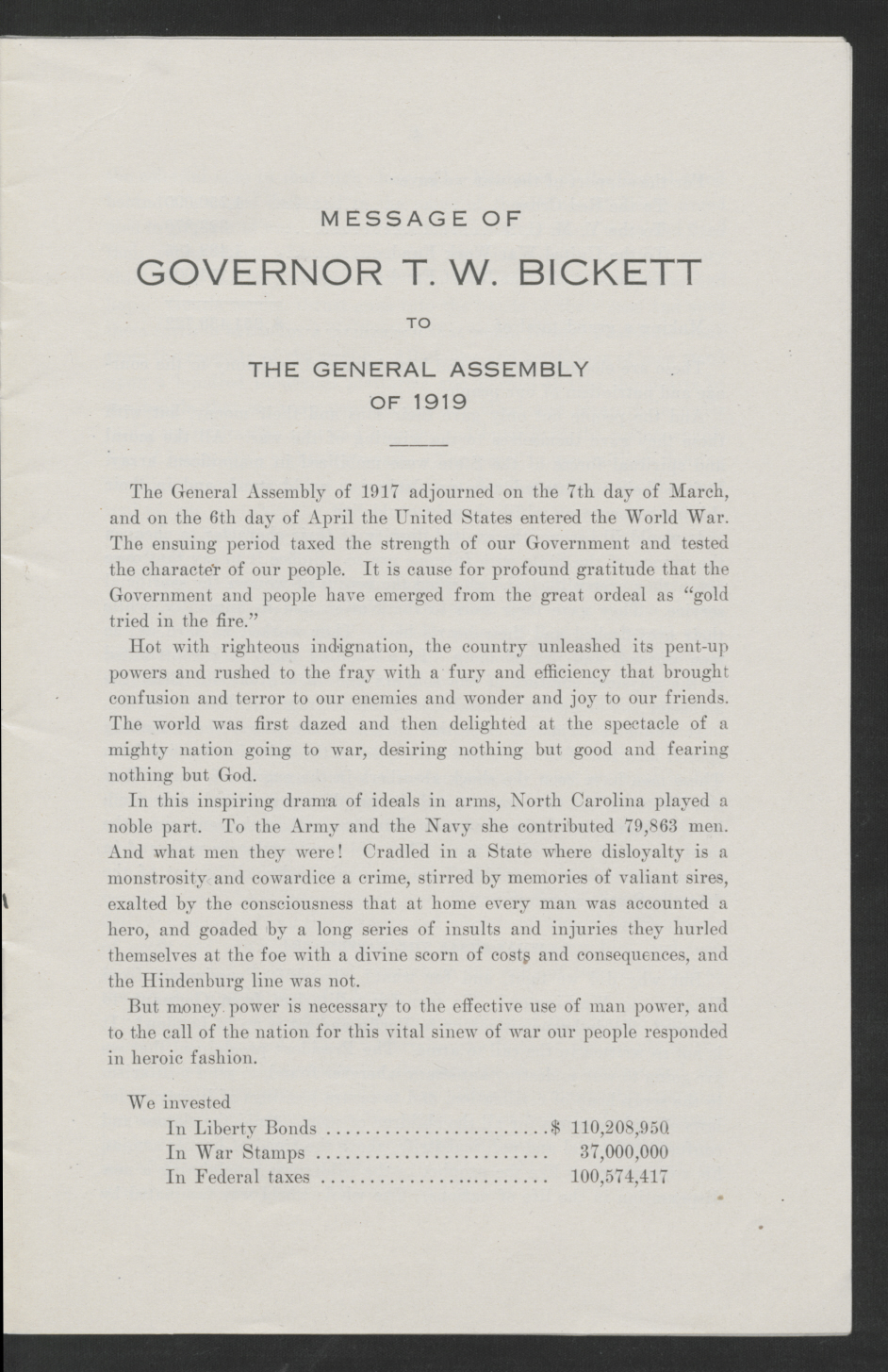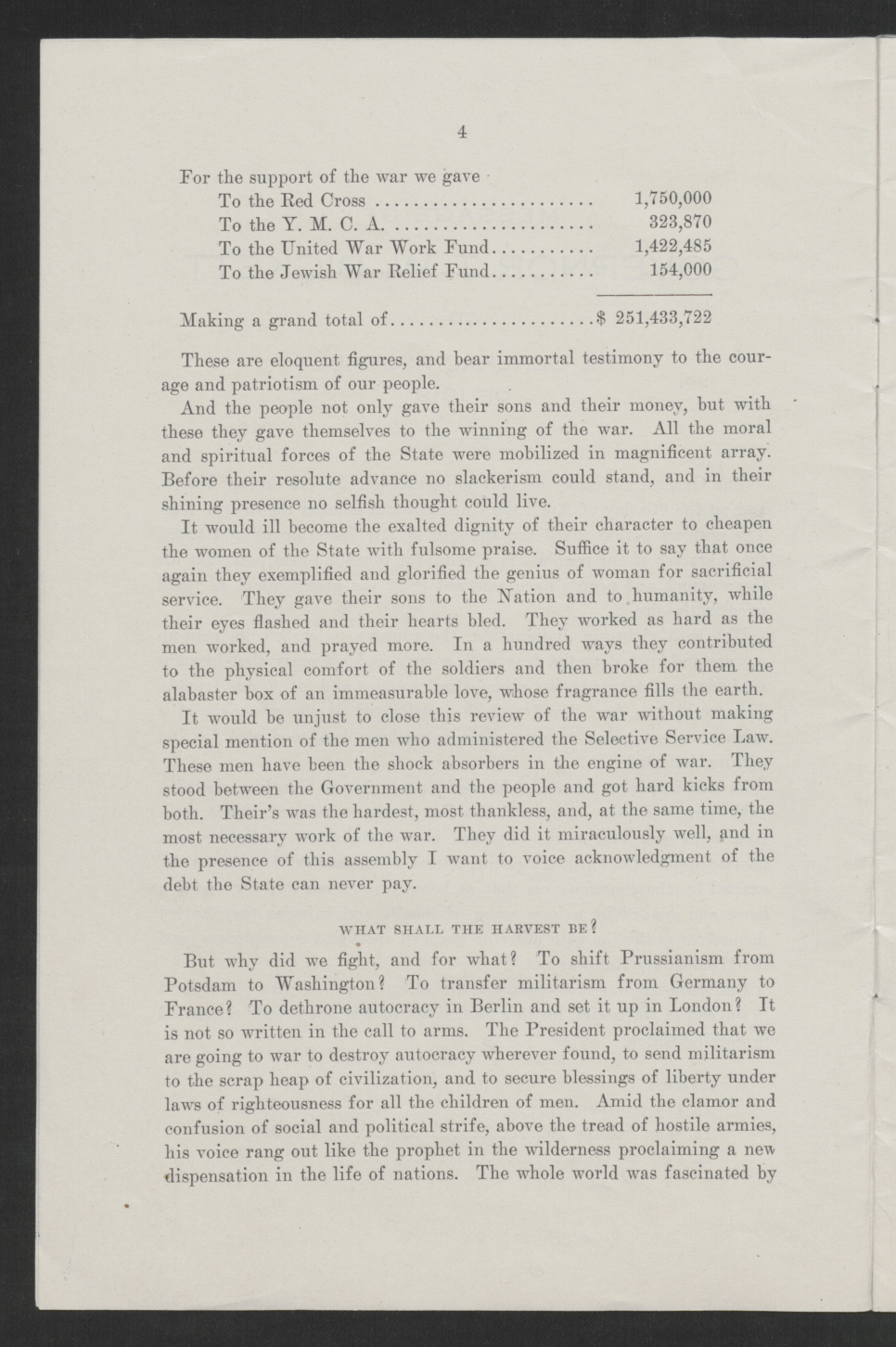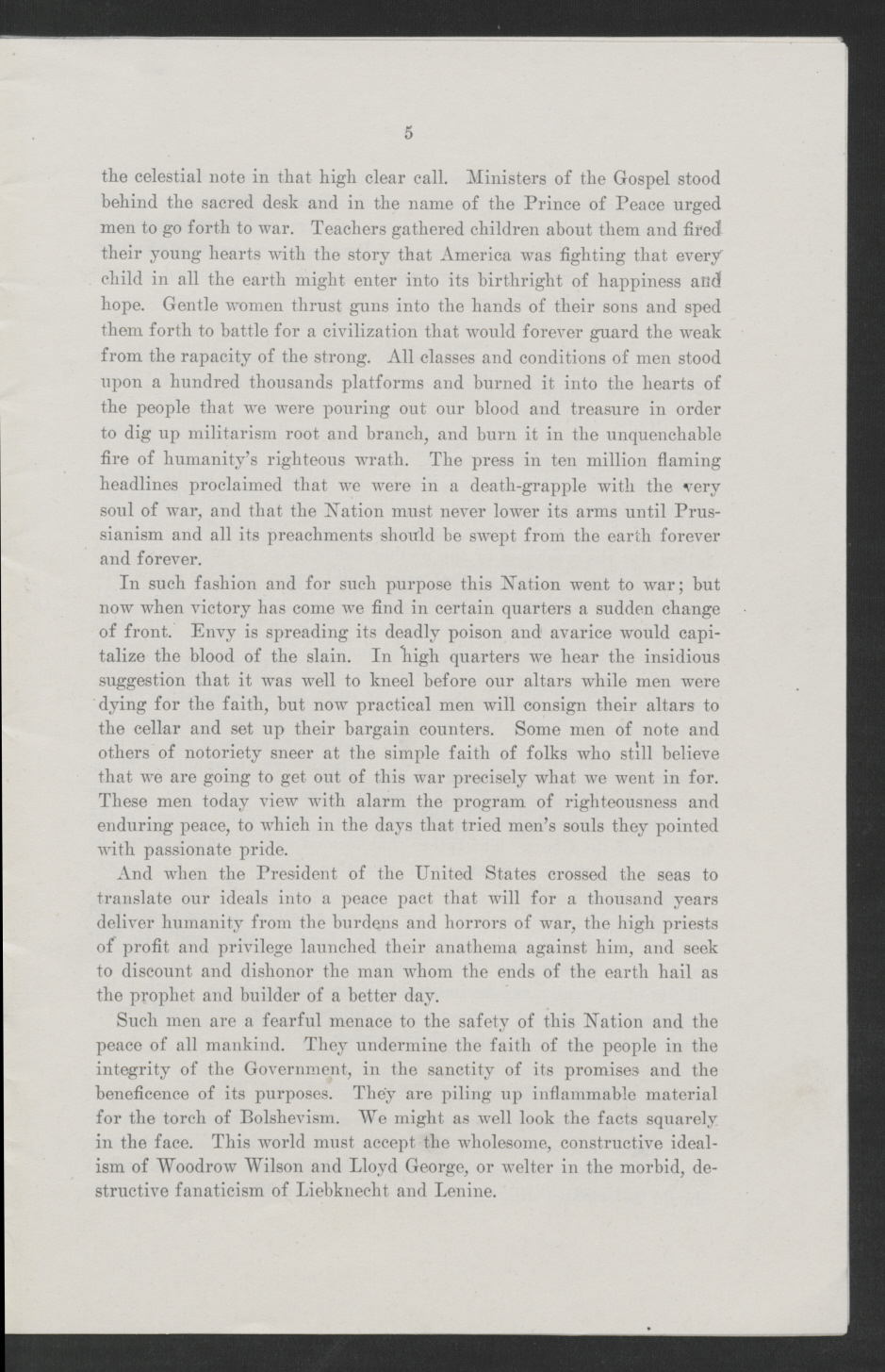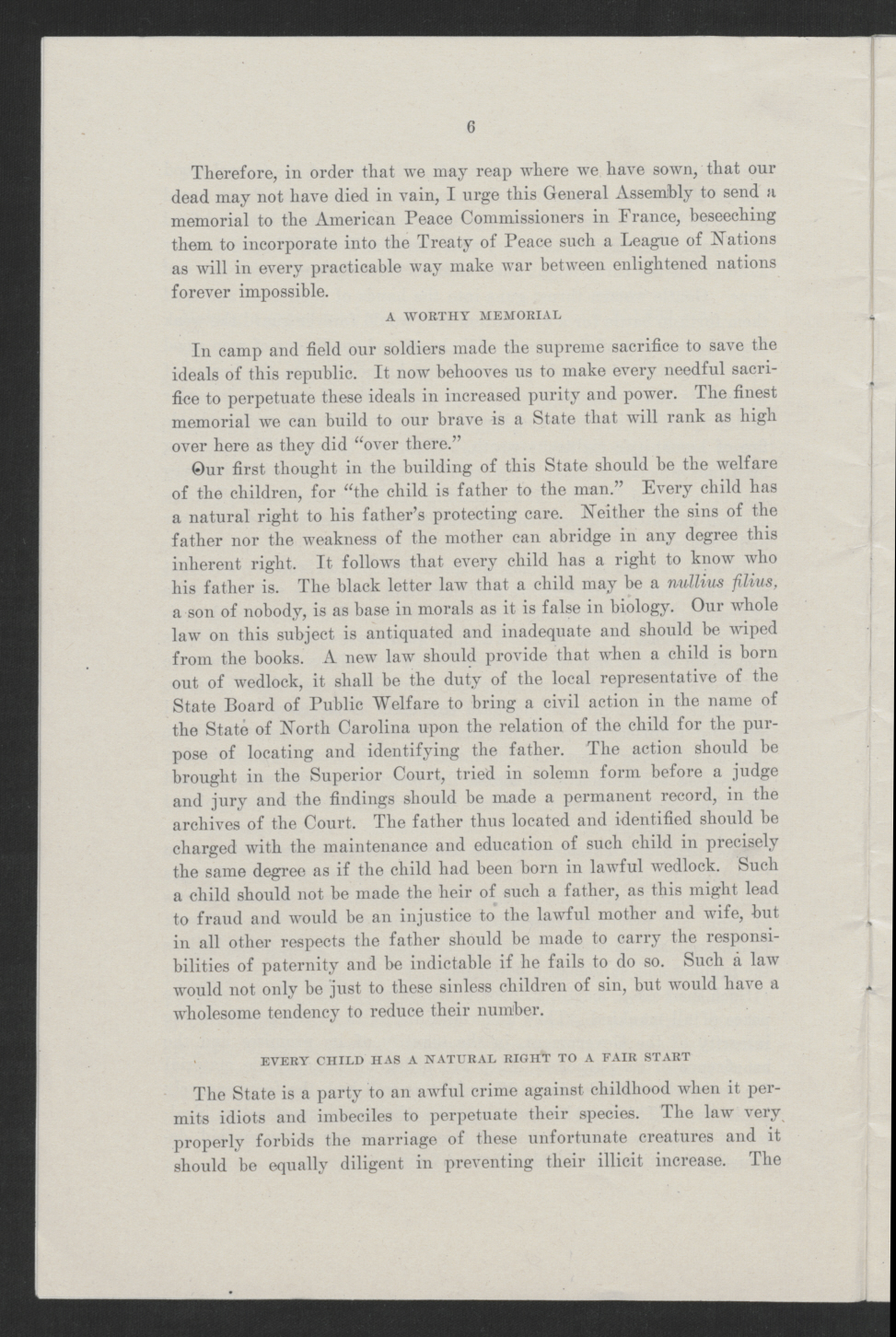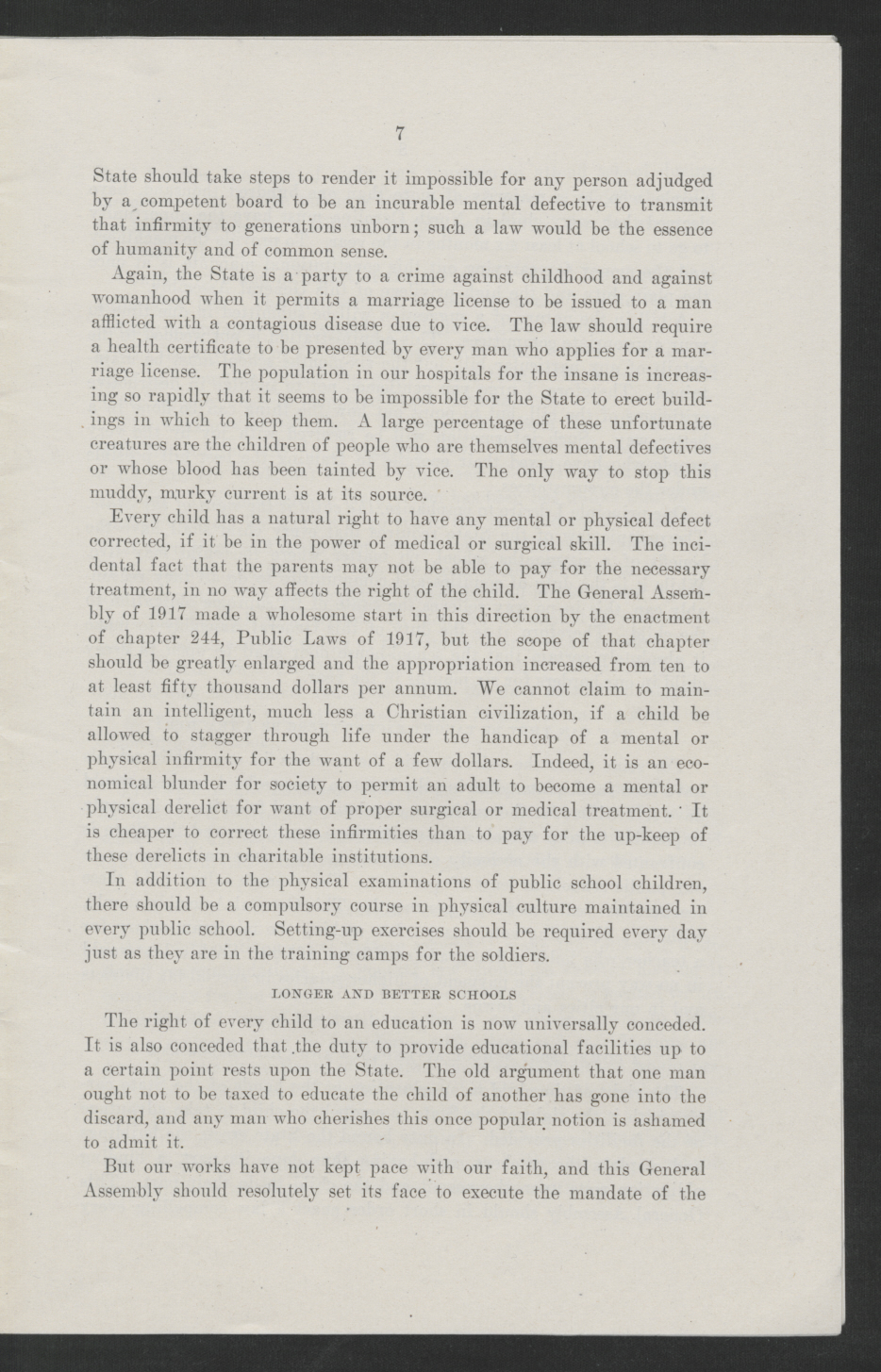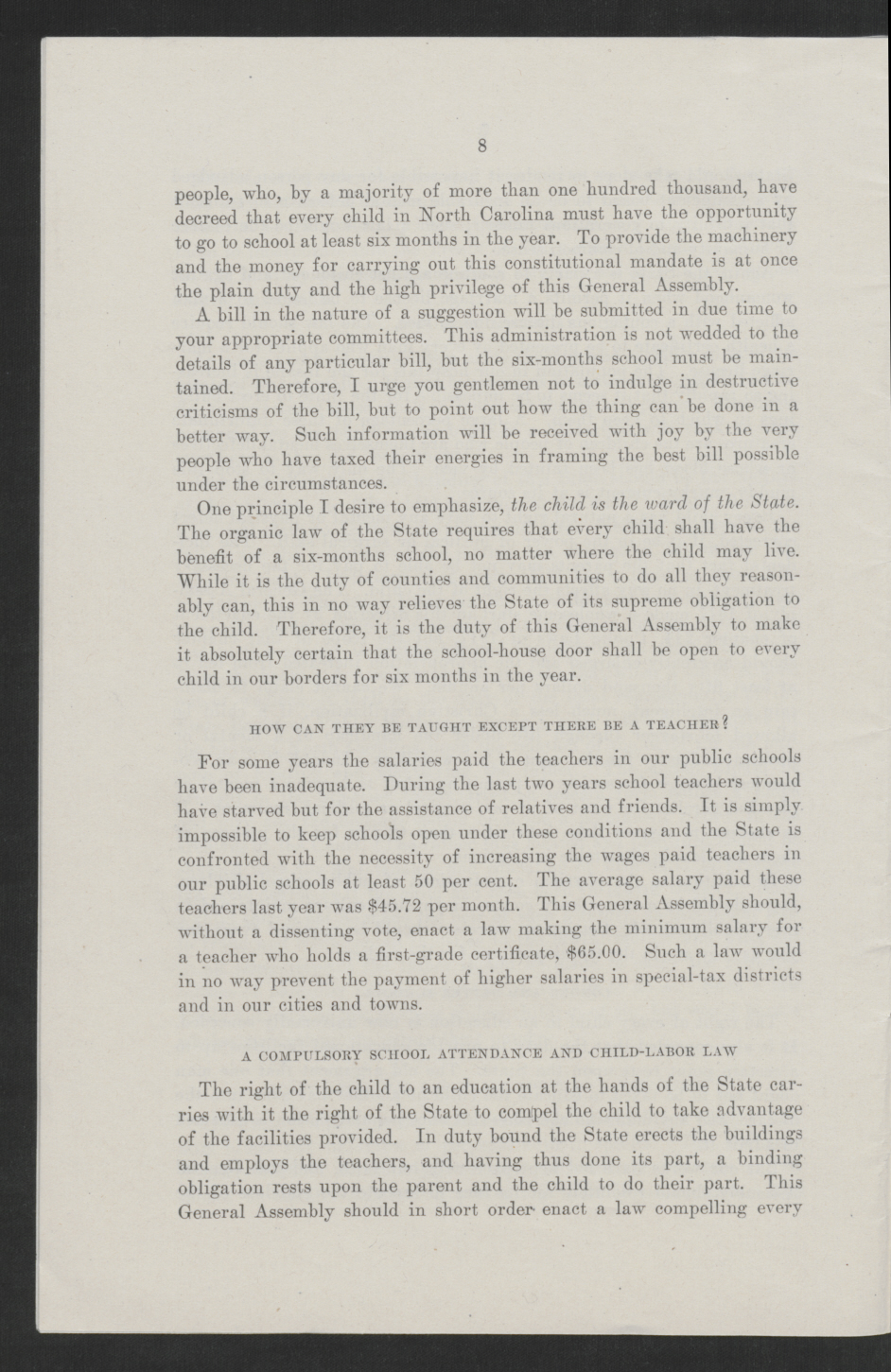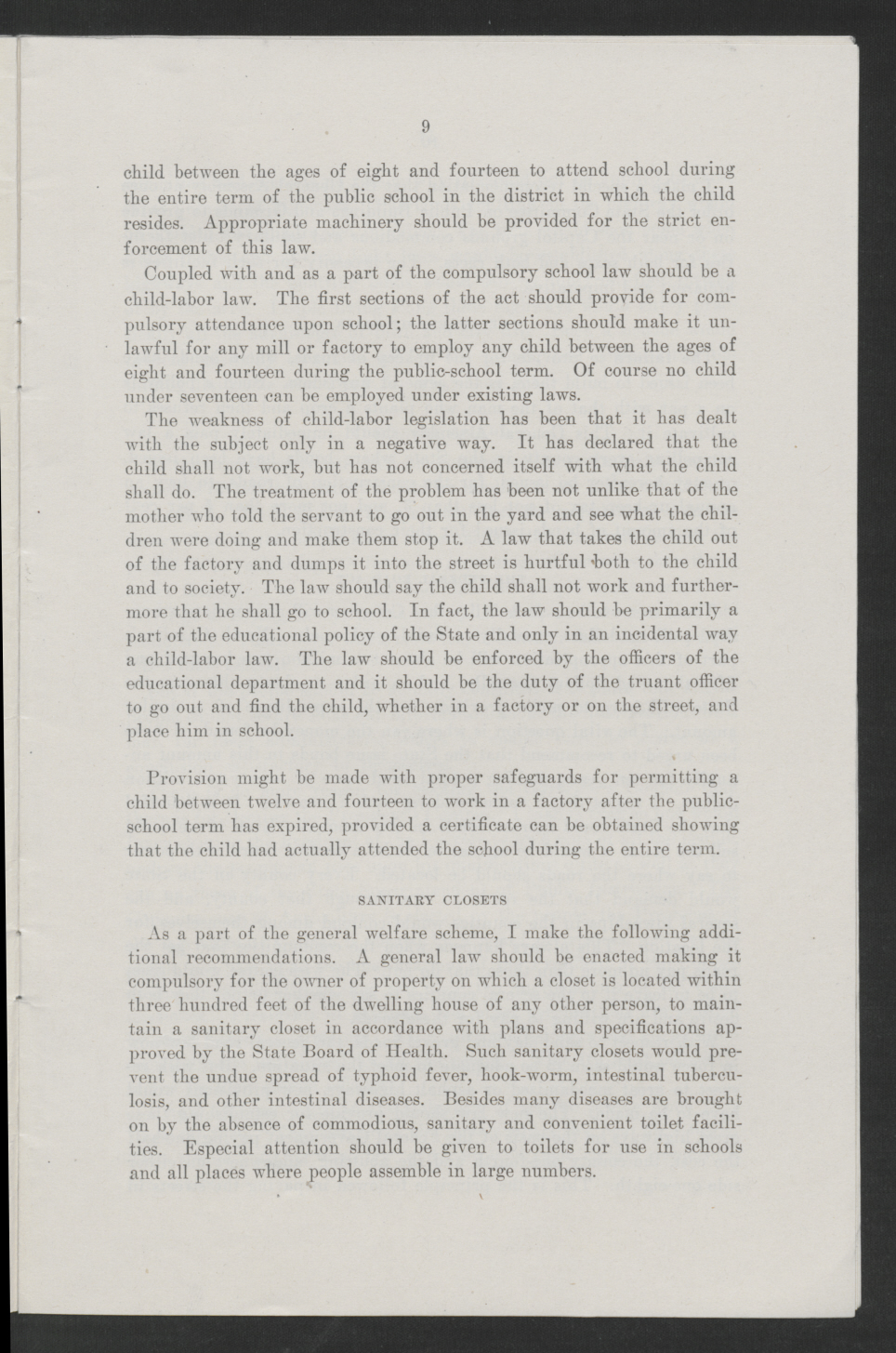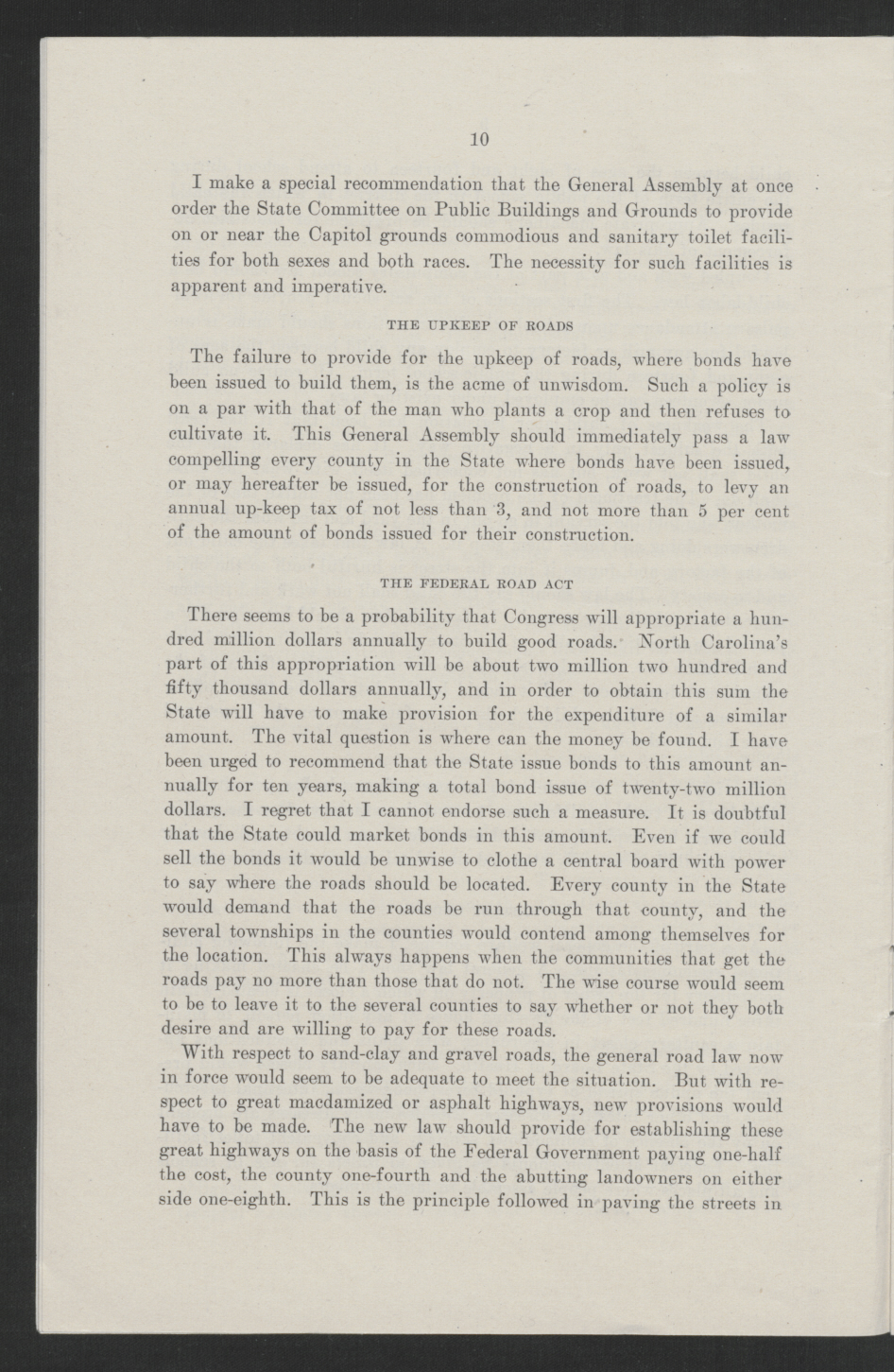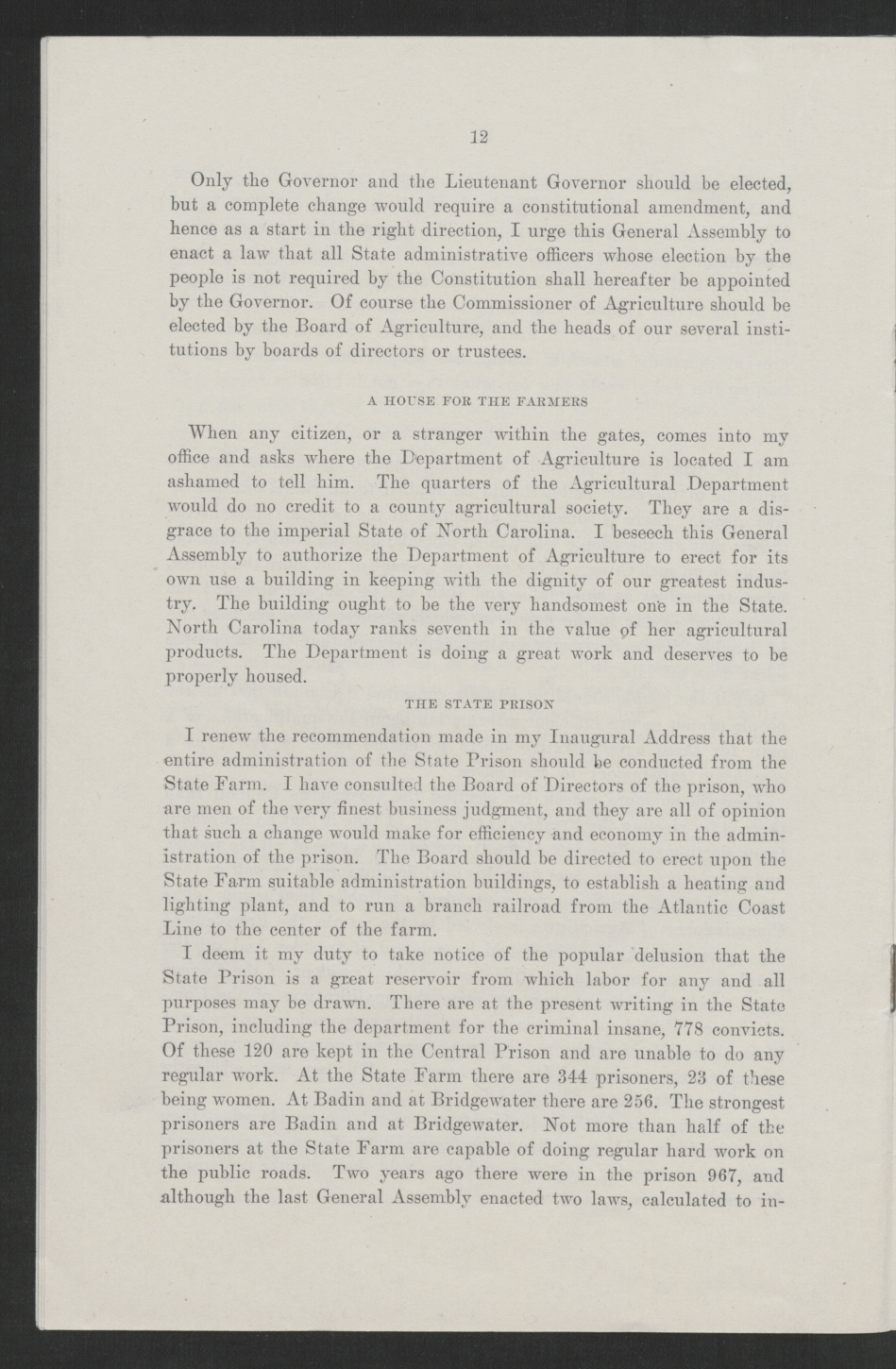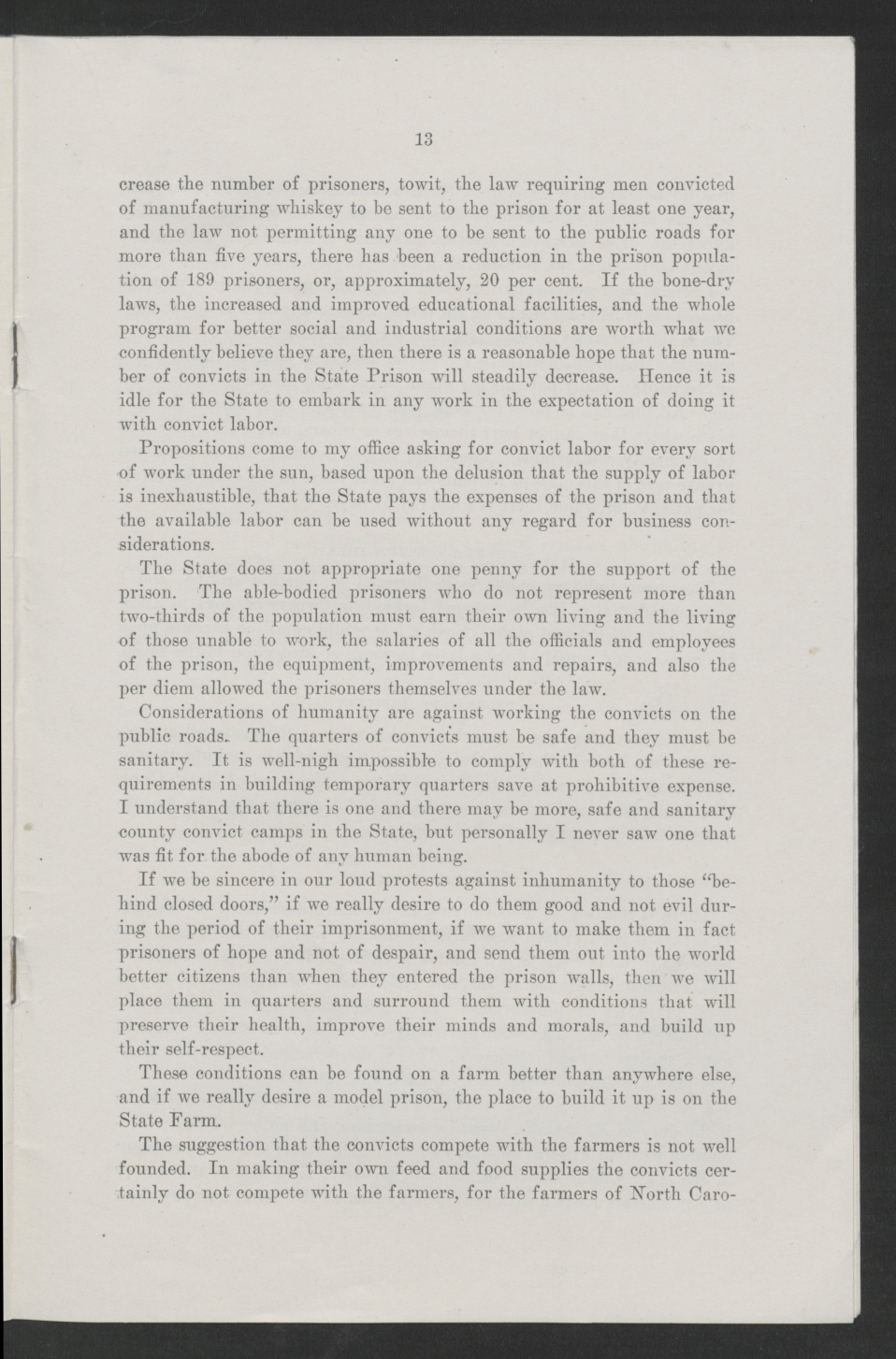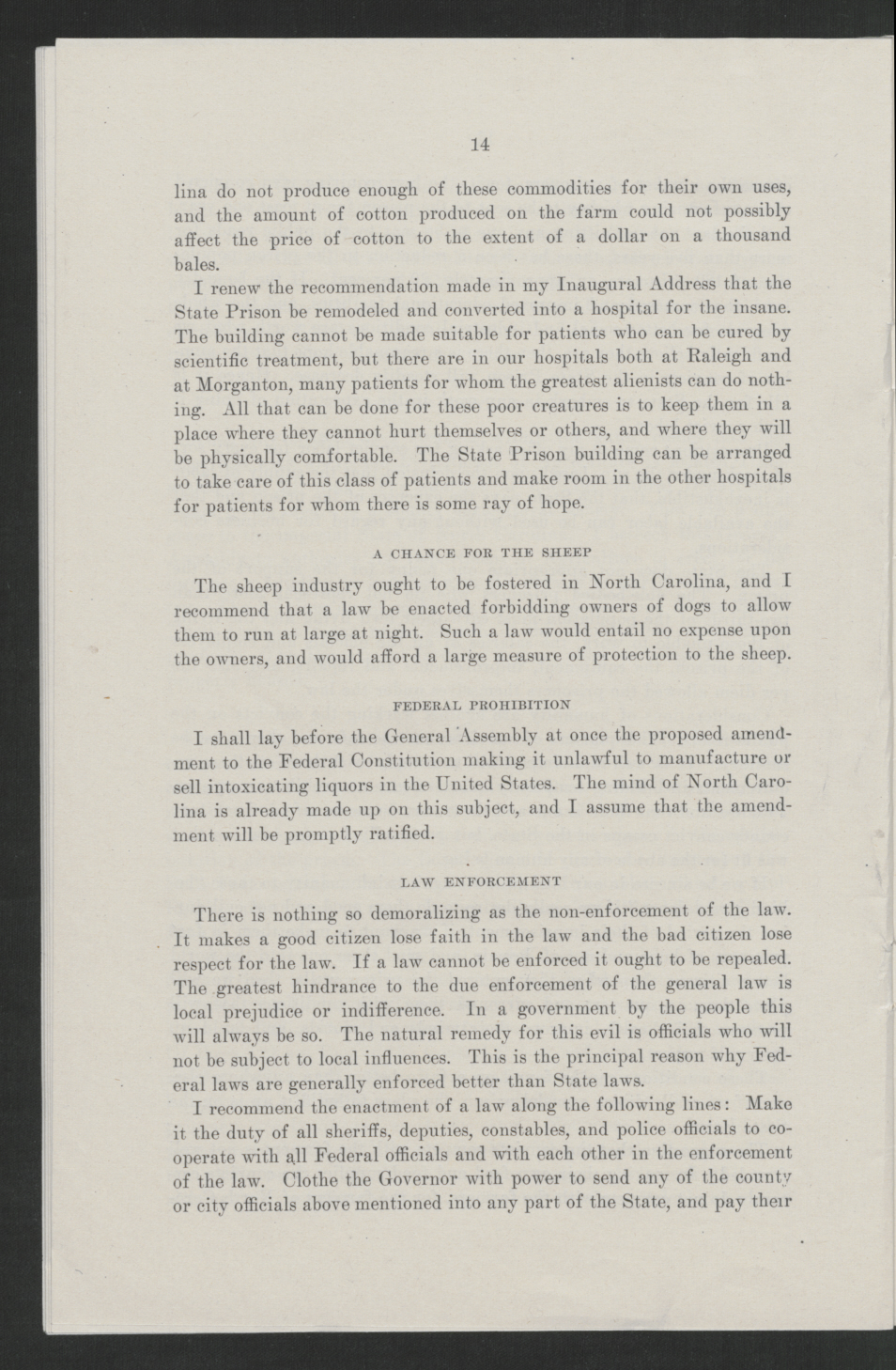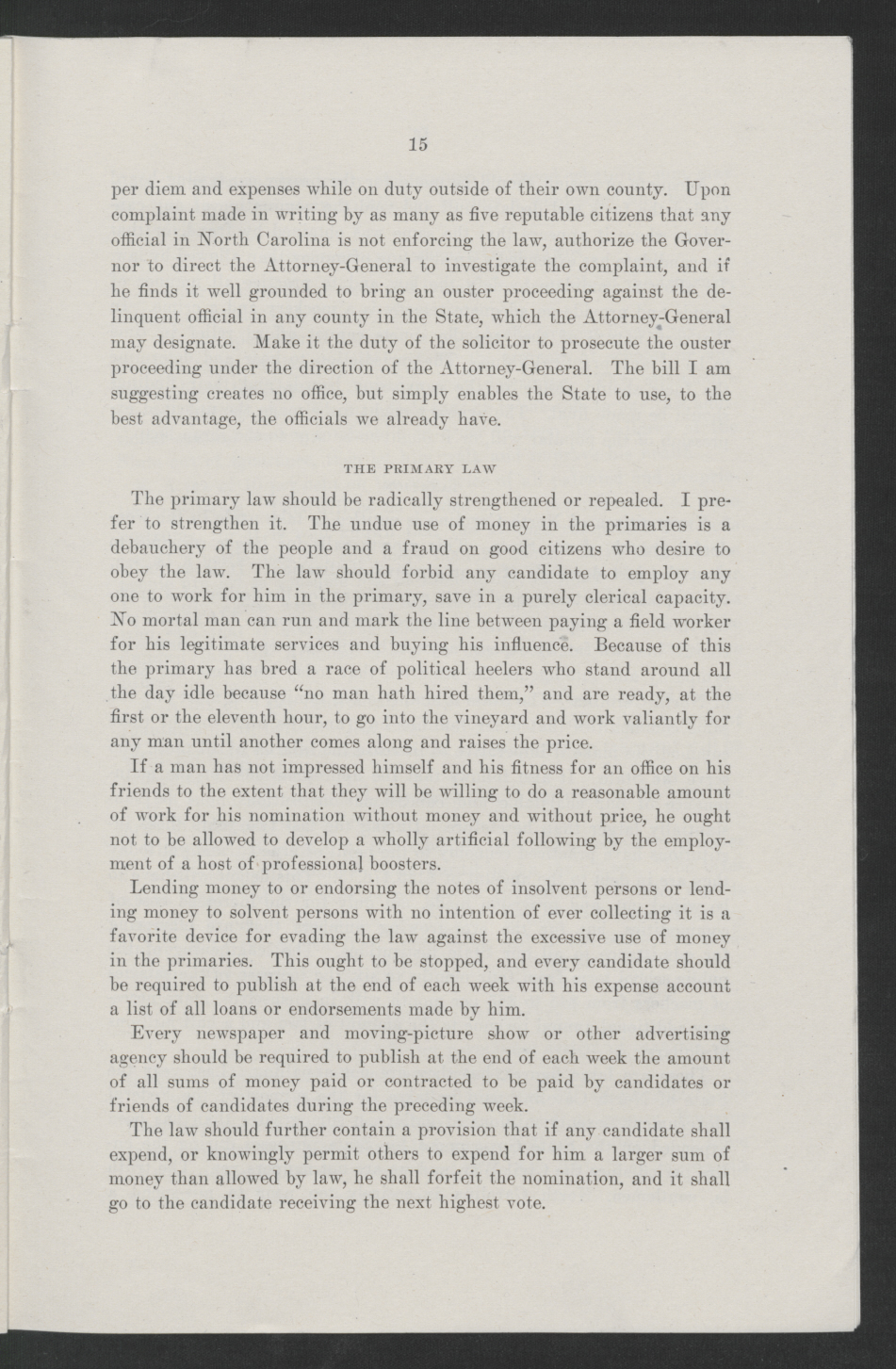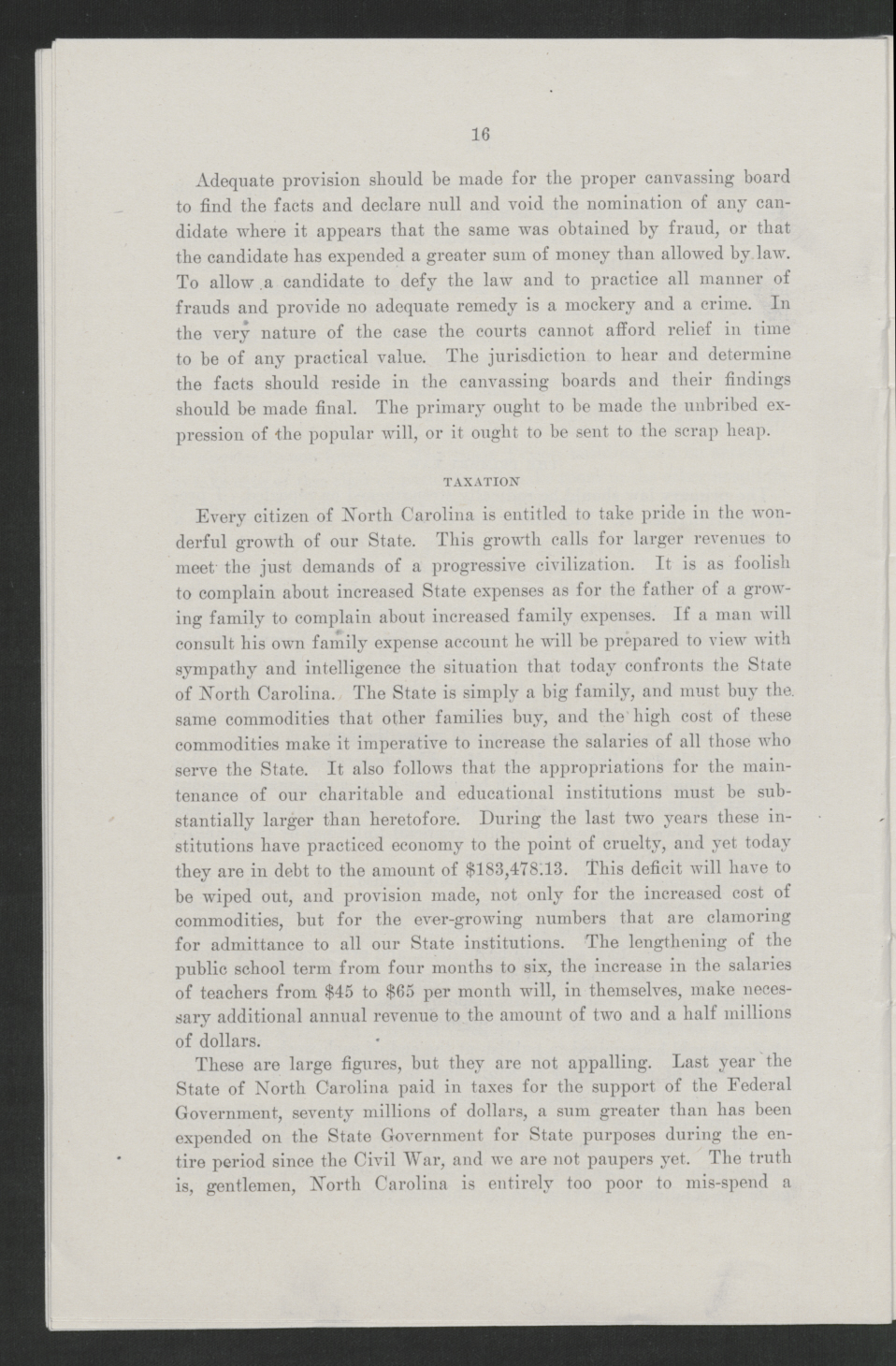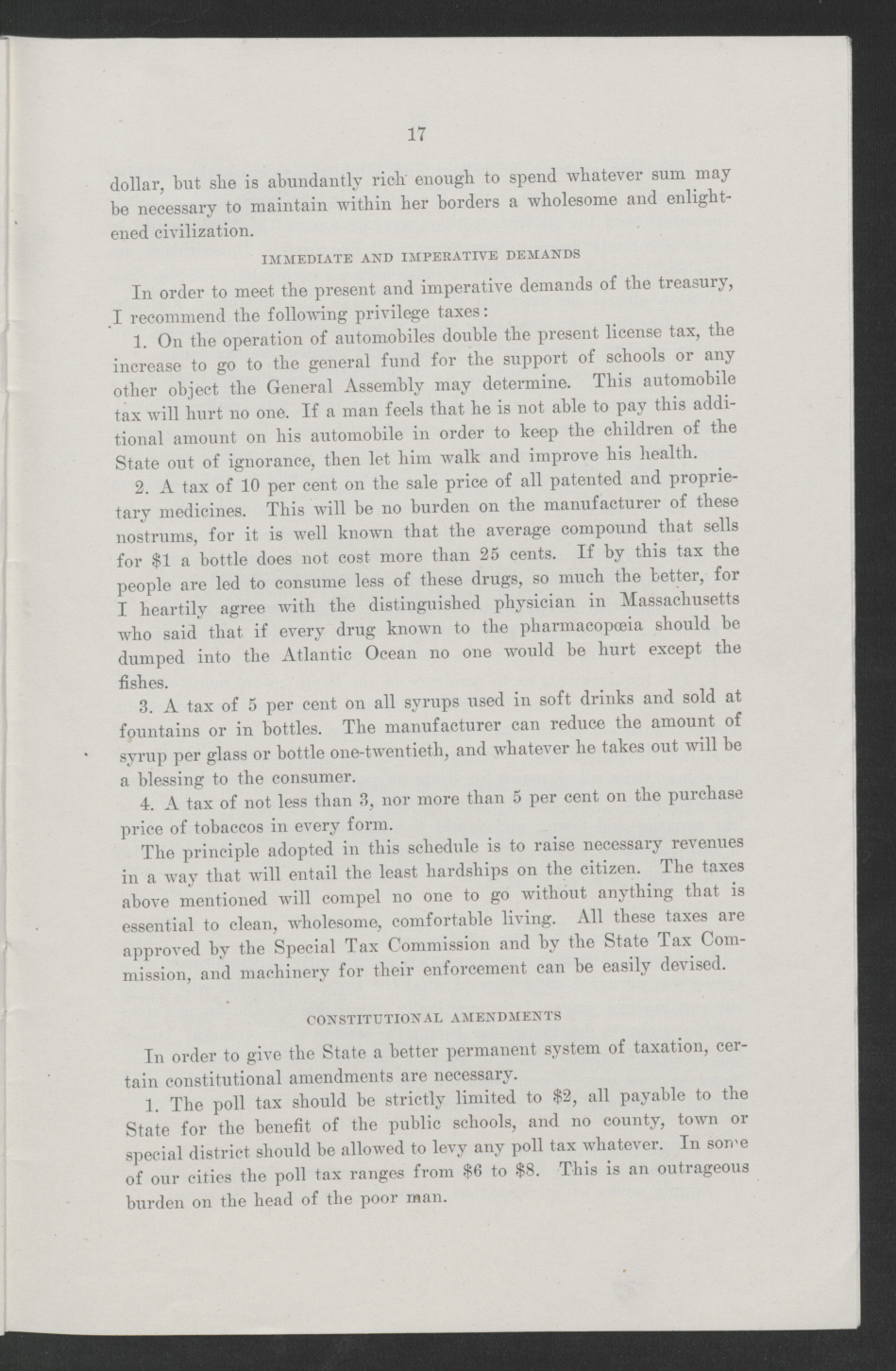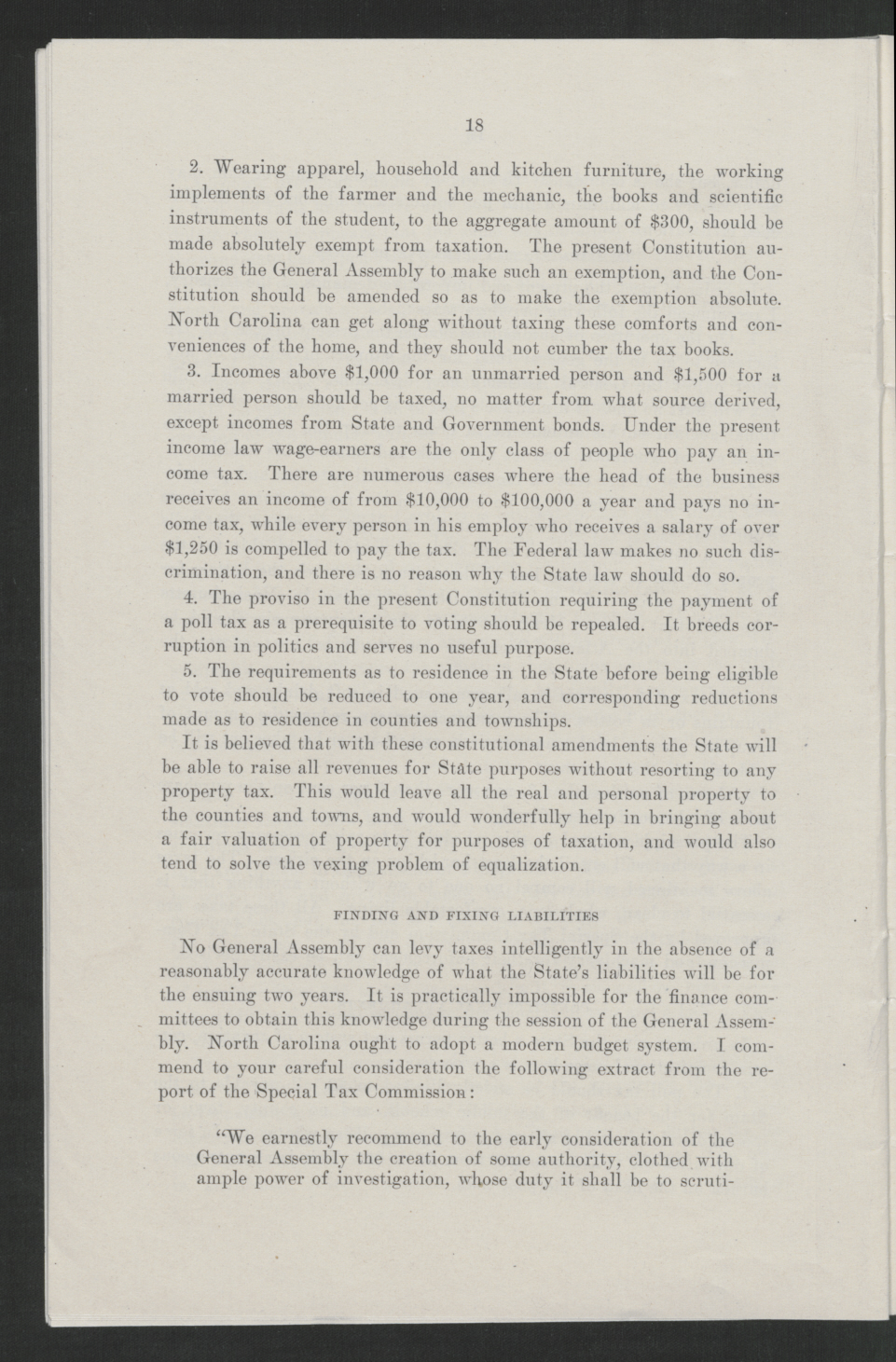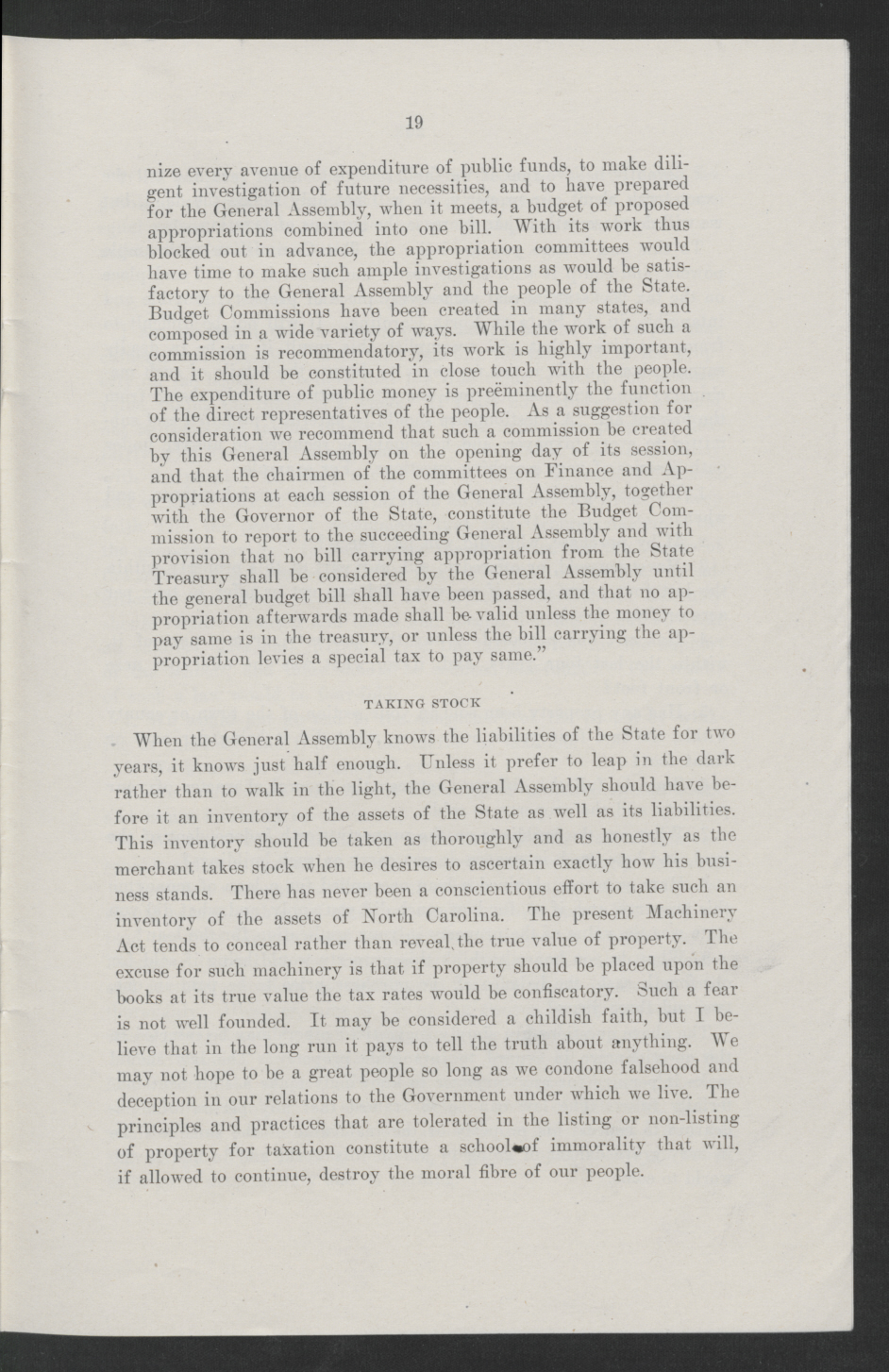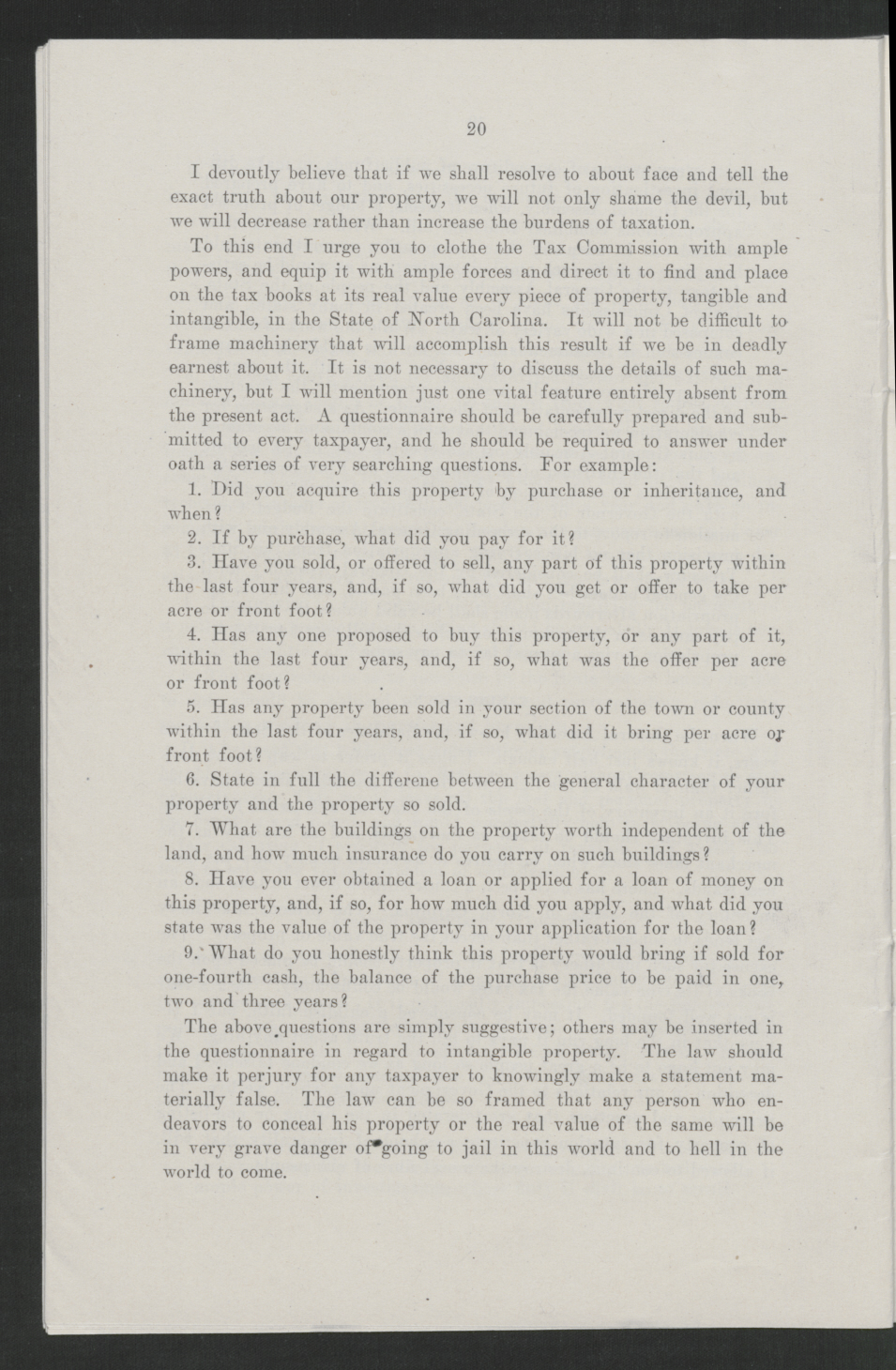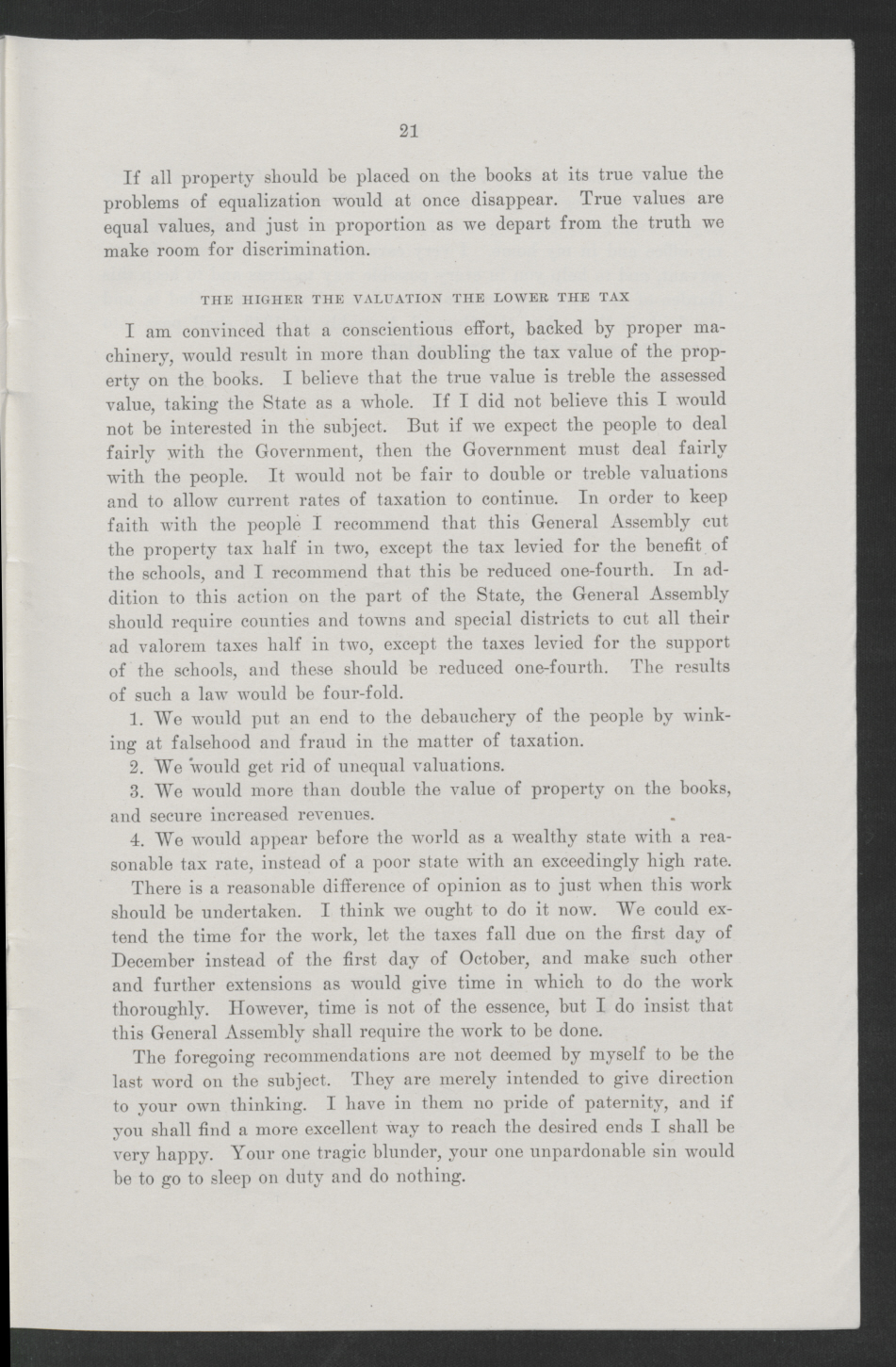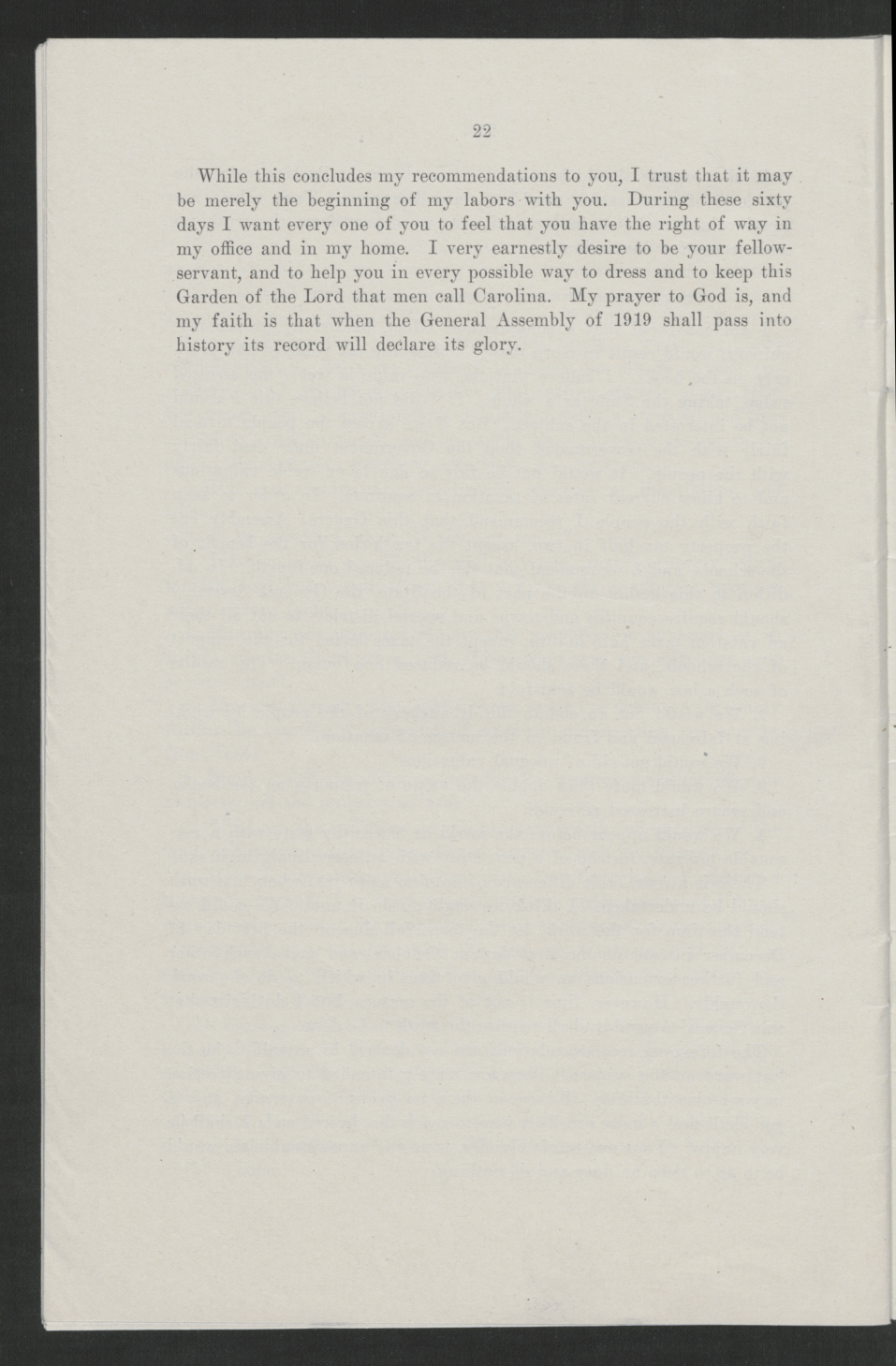MESSAGE OF
GOVERNOR T. W. BICKETT
TO
THE GENERAL ASSEMBLY
OF 1919
The General Assembly of 1917 adjourned on the 7th day of March, and on the 6th day of April the United States entered the World War. The ensuing period taxed the strength of our Government and tested the character of our people. It is cause for profound gratitude that the Government and people have emerged from the great ordeal as "gold tried in the fire."
Hot with righteous indignation, the country unleashed its pent-up powers and rushed to the fray with a fury and efficiency that brought confusion and terror to our enemies and wonder and joy to our friends. The world was first dazed and then delighted at the spectacle of a mighty nation going to war, desiring nothing but good and fearing nothing but God.
In this inspiring drama of ideals in arms, North Carolina played a noble part. To the Army and the Navy she contributed 79,863 men. And what men they were! Cradled in a State where disloyalty is a monstrosity and cowardice a crime, stirred by memories of valiant sires, exalted by the consciousness that at home every man was accounted a hero, and goaded by a long series of insults and injuries they hurled themselves at the foe with a divine scorn of costs and consequences, and the Hindenburg line was not.
But money power is necessary to the effective use of man power, and to the call of the nation for this vital sinew of war our people responded in heroic fashion.
We invested
In Liberty Bonds $110,208,950
In War Stamps 37,000,000
In Federal taxes 100,574,417
For the support of the war we gave
To the Red Cross 1,750,000
To the Y. M. C. A. 323,870
To the United War Work Fund 1,422,485
To the Jewish War Relief Fund 154,000
Making a grand total of $251,433,722
These are eloquent figures, and bear immortal testimony to the courage and patriotism of our people.
And the people not only gave their sons and their money, but with these they gave themselves to the winning of the war. All the moral and spiritual forces of the State were mobilized in magnificent array. Before their resolute advance no slackerism could stand, and in their shining presence no selfish thought could live.
It would ill become the exalted dignity of their character to cheapen the women of the State with fulsome praise. Suffice it to say that once again they exemplified and glorified the genius of woman for sacrificial service. They gave their sons to the Nation and to humanity, while their eyes flashed and their hearts bled. They worked as hard as the men worked, and prayed more. In a hundred ways they contributed to the physical comfort of the soldiers and then broke for them the alabaster box of immeasurable love, whose fragrance fills the earth.
It would be unjust to close this review of the war without making special mention of the men who administered the Selective Service Law. These men have been the shock absorbers in the engine of war. They stood between the Government and the people and got hard kicks from both. Their's was the hardest, most thankless, and, at the same time, the most necessary work of the war. They did it miraculously well, and in the presence of this assembly I want to voice acknowledgement of the debt the State can never pay.
WHAT SHALL THE HARVEST BE?
But why did we fight, and for what? To shift Prussianism from Potsdam to Washington? To transfer militarism from Germany to France? To dethrone autocracy in Berlin and set it up in London? It is not so written in the call to arms. The President proclaimed that we are going to war to destroy autocracy wherever found, to send militarism to the scrap heap of civilization, and to secure blessings of liberty under laws of righteousness for all the children of men. Amid the clamor and confusion of social and political strife, above the tread of hostile armies, his voice rang out like the prophet in the wilderness proclaiming a new dispensation in the life of nations. The whole world was fascinated by the celestial note in that high clear call. Ministers of the Gospel stood behind the sacred desk and in the name of the Prince of Peace urged men to go forth to war. Teachers gathered children about them and fired their young hearts with the story that America was fighting that every child in all the earth might enter into its birthright of happiness and hope. Gentle women thrust guns into the hands of their sons and sped them forth to battle for a civilization that would forever guard the weak from the rapacity of the strong. All classes and conditions of men stood upon a hundred thousand platforms and burned it into the hearts of the people that we were pouring out our blood and treasure in order to dig up militarism root and branch, and burn it in the unquenchable fire of humanity's righteous wrath. The press in ten million flaming headlines proclaimed that we were in a death-grapple with the very soul of war, and that the Nation must never lower its arms until Prussianism and all its preachments should be swept from the earth forever and forever.
In such fashion and for such purpose this Nation went to war; but now when victory has come we find in certain quarters a sudden change of front. Envy is spreading its deadly poison and avarice would capitalize the blood of the slain. In high quarters we hear the insidious suggestion that it was well to kneel before our altars while men were dying for the faith, but now practical men will consign their altars to the cellar and set up their bargain counters. Some men of note and others of notoriety sneer at the simple faith of folks who still believe that we are going to get out of this war precisely what we went in for. These men today view with alarm the program of righteousness and enduring peace, to which in the days that tried men's souls they pointed with passionate pride.
And when the President of the United States crossed the seas to translate our ideals into a peace pact that will for a thousand years deliver humanity from the burdens and horrors of war, the high priests of profit and privilege launched their anathema against him, and seek to discount and dishonor the man whom the ends of the earth hail as the prophet and builder of a better day.
Such men are a fearful menace to the safety of this Nation and the peace of all mankind. They undermine the faith of the people in the integrity of the Government, in the sanctity of its promises and the beneficence of its purposes. They are piling up inflammable material for the torch of Bolshevism. We might as well look the facts squarely in the face. This world must accept the wholesome, constructive idealism of Woodrow Wilson and Lloyd George, or welter in the morbid, destructive fanaticism of Liebknecht and Lenine.
Therefore, in order that we may reap where we have sown, that our dead may not have died in vain, I urge this General Assembly to send a memorial to the American Peace Commissioners in France, beseeching them to incorporate into the Treaty of Peace such a League of Nations as will in every practicable way make war between enlightened nations forever impossible.
A WORTHY MEMORIAL
In camp and field our soldiers made the supreme sacrifice to save the ideals of this republic. It now behooves us to make every needful sacrifice to perpetuate these ideals in increased purity and power. The finest memorial we can build to our brave is a State that will rank as high over here as they did "over there."
Our first thought in the building of this State should be the welfare of the children, for "the child is father to the man." Every child has a natural right to his father's protecting care. Neither the sins of the father nor the weakness of the mother can abridge in any degree this inherent right. It follows that every child has a right to know who his father is. The black letter law that a child may be a nullius filius, a son of nobody, is as base in morals as it is false in biology. Our whole law on this subject is antiquated and inadequate and should be wiped from the books. A new law should provide that when a child is born out of wedlock, it shall be the duty of the local representative of the State Board of Public Welfare to bring a civil action in the name of the State of North Carolina upon the relation of the child for the purpose of locating and identifying the father. The action should be brought in the Superior Court, tried in solemn form before a judge and jury and the findings should be made a permanent record, in the archives of the court. The father thus located and identified should be charged with the maintenance and education of such child in precisely the same degree as if the child had been born in lawful wedlock. Such a child should not be made the heir of such a father, as this might lead to fraud and would be an injustice to the lawful mother and wife, but in all other respects the father should be made to carry the responsibilities of paternity and be indictable if he fails to do so. Such a law would not only be just to these sinless children of sin, but would have a wholesome tendency to reduce their number.
EVERY CHILD HAS A NATURAL RIGHT TO A FAIR START
The State is a party to an awful crime against childhood when it permits idiots and imbeciles to perpetuate their species. The law very properly forbids the marriage of these unfortunate creatures and it should be equally diligent in preventing their illicit increase. The State should take steps to render it impossible for any person adjudged by a competent board to be an incurable mental defective to transmit that infirmity to generations unborn; such a law would be the essence of humanity and of common sense.
Again, the State is a party to a crime against childhood and against womanhood when it permits a marriage license to be issued to a man afflicted with a contagious disease due to vice. The law should require a health certificate to he presented by every man who applies for a marriage license. The population in our hospitals for the insane is increasing so rapidly that it seems to be impossible for the State to erect buildings in which to keep them. A large percentage of these unfortunate creatures are the children of people who are themselves mental defectives or whose blood has been tainted by vice. The only way to stop this muddy, murky current is at its source.
Every child has a natural right to have any mental or physical defect corrected, if it be in the power of medical or surgical skill. The incidental fact that the parents may not be able to pay for the necessary treatment, in no way affects the rights of the child. The General Assembly of 1917 made a wholesome start in this direction by the enactment of chapter 244, Public Laws of 1917, but the scope of that chapter should be greatly enlarged and the appropriation increased from ten to at least fifty thousand dollars per annum. We cannot claim to maintain an intelligent, much less a Christian civilization, if a child be allowed to stagger through life under the handicap of a mental or physical infirmity for the want of a few dollars. Indeed, it is an economical blunder for society to permit an adult to become a mental or physical derelict for want of proper surgical or medical treatment. It is cheaper to correct these infirmities than to pay for the up-keep of these derelicts in charitable institutions.
In addition to the physical examinations of public school children, there should be a compulsory course in physical culture maintained in every public school. Setting-up exercises should be required every day just as they are in the training camps for the soldiers.
LONGER AND BETTER SCHOOLS
The right of every child to an education is now universally conceded. It is also conceded that the duty to provide educational facilities up to a certain point rests upon the State. The old argument that one man ought not to be taxed to educate the child of another has gone into the discard, and any man who cherishes this once popular notion is ashamed to admit it.
But our works have not kept pace with our faith, and this General Assembly should resolutely set its face to execute the mandate of the people, who, by a majority of more than one hundred thousand, have decreed that every child in North Carolina must have the opportunity to go to school at least six months in the year. To provide the machinery and the money for carrying out this constitutional mandate is at once the plain duty and the high privilege of this General Assembly.
A bill in the nature of a suggestion will be submitted in due time to your appropriate committees. This administration is not wedded to the details of any particular bill, but the six-months school must be maintained. Therefore, I urge you gentlemen not to indulge in destructive criticisms of the bill, but to point out how the thing can be done in a better way. Such information will be received with joy by the very people who have taxed their energies in framing the best bill possible under the circumstances.
One principle I desire to emphasize, the child is the ward of the State. The organic law of the State requires that every child shall have the benefit of a six-months school, no matter where the child may live. While it is the duty of counties and communities to do all they reasonably can, this in no way relieves the State of its supreme obligation to the child. Therefore, it is the duty of this General Assembly to make it absolutely certain that the school-house door shall be open to every child in our borders for six months in the year.
HOW CAN THEY BE TAUGHT EXCEPT THERE BE A TEACHER?
For some years the salaries paid the teachers in our public schools have been inadequate. During the last two years school teachers would have starved but for the assistance of relatives and friends. It is simply impossible to keep schools open under these conditions and the State is confronted with the necessity of increasing the wages paid teachers in our public schools at least 50 per cent. The average salary paid these teachers last year was $45.72 per month. This General Assembly should, without a dissenting vote, enact a law making the minimum salary for a teacher who holds a first-grade certificate, $65.00. Such a law would in no way prevent the payment of higher salaries in special-tax districts and in our cities and towns.
A COMPULSORY SCHOOL ATTENDANCE AND CHILD-LABOR LAW
The right of the child to an education at the hands of the State carries with it the right of the State to compel the child to take advantage of the facilities provided. In duty bound the State erects the buildings and employs the teachers, and having thus done its part, a binding obligation rests upon the parent and the child to do their part. This General Assembly should in short order enact a law compelling every child between the ages of eight and fourteen to attend school during the entire term of the public school in the district in which the child resides. Appropriate machinery should be provided for the strict enforcement of this law.
Coupled with and as a part of the compulsory school law should be a child-labor law. The first sections of the act should provide for compulsory attendance upon school; the latter sections should make it unlawful for any mill or factory to employ any child between the ages of eight and fourteen during the public-school term. Of course no child under seventeen can be employed under existing laws.
The weakness of child-labor legislation has been that it has dealt with the subject only in a negative way. It has declared that the child shall not work, but has not concerned itself with what the child shall do. The treatment of the problem has been not unlike that of the mother who told the servant to go out in the yard and see what the children were doing and make them stop it. A law that takes the child out of the factory and dumps it into the street is hurtful both to the child and to society. The law should say the child shall not work and furthermore that he shall go to school. In fact, the law should be primarily a part of the educational policy of the State and only in an incidental way a child-labor law. The law should be enforced by the officers of the educational department and it should be the duty of the truant officer to go out and find the child, whether in a factory or on the street, and place him in school.
Provision might be made with proper safeguards for permitting a child between twelve and fourteen to work in a factory after the public-school term has expired, provided a certificate can be obtained showing that the child had actually attended the school during the entire term.
SANITARY CLOSETS
As a part of the general welfare scheme, I make the following additional recommendations. A general law should be enacted making it compulsory for the owner of property on which a closet is located within three hundred feet of the dwelling house of any other person, to maintain a sanitary closet in accordance with plans and specifications approved by the State Board of Health. Such sanitary closets would prevent the undue spread of typhoid fever, hook-worm, intestinal tuberculosis, and other intestinal diseases. Besides many diseases are brought on by the absence of commodious, sanitary and convenient toilet facilities. Especial attention should be given to toilets for use in schools and all places where people assemble in large numbers.
I make a special recommendation that the General Assembly at once order the State Committee on Public Buildings and Grounds to provide on or near the Capitol grounds commodious and sanitary toilet facilities for both sexes and both races. The necessity for such facilities is apparent and imperative.
THE UPKEEP OF ROADS
The failure to provide for the upkeep of roads, where bonds have been issued to build them, is the acme of unwisdom. Such a policy is on a par with that of the man who plants a crop and then refuses to cultivate it. This General Assembly should immediately pass a law compelling every county in the State where bonds have been issued, or may hereafter be issued, for the construction of roads, to levy an annual up-keep tax of not less than 3, and not more than 5 per cent of the amount of bonds issued for their construction.
THE FEDERAL ROAD ACT
There seems to be a probability that Congress will appropriate a hundred million dollars annually to build good roads. North Carolina's part of this appropriation will be about two million two hundred and fifty thousand dollars annually, and in order to obtain this sum the State will have to make provision for the expenditure of a similar amount. The vital question is where can the money be found. I have been urged to recommend that the State issue bonds to this amount annually for ten years, making a total bond issue of twenty-two million dollars. I regret that I cannot endorse such a measure. It is doubtful that the State could market bonds in this amount. Even if we could sell the bonds it would be unwise to clothe a central board with power to say where the roads should be located. Every county in the State would demand that the roads he run through that county, and the several townships in the counties would contend among themselves for the location. This always happens when the communities that get the roads pay no more than those that do not. The wise course would seem to be to leave it to the several counties to say whether or not they both desire and are willing to pay for these roads.
With respect to sand-clay and gravel roads, the general road law now in force would seem to be adequate to meet the situation. But with respect to great macadamized or asphalt highways, new provisions would have to be made. The new law should provide for establishing these great highways on the basis of the Federal Government paying one-half the cost, the county one-fourth and the abutting landowners on either side one-eighth. This is the principle followed in paving the streets in our cities, and there is no reason why it should not be applied to these great permanent highways. The lands abutting on the highway would be doubled and quadrupled in value. The time would soon come when water mains and electric light lines would be established along these highways and the abutting lands would sell by the front-foot instead of by the acre. People living along these highways would enjoy practically all the advantages of town and city life. Such a scheme would prevent unseemly scrambles among the people, and communities obtaining the roads would pay for what they got.
THE SHORT BALLOT
At the expense of repetition I am constrained to again insist that the principle of the short ballot should be applied to all State administrative offices. There is something attractive to the popular mind in the theory that all the people select these officials, but the truth is that the people do no such thing. A few men, an average of not more than three, select themselves as candidates and then the people are accorded the privilege of saying in the primaries which of these three are least objectionable. There never was a more tragic delusion than that the people select these officials.
But if the people should be actually consulted it is plain that all the people cannot secure sufficient information about the qualifications of a man for these administrative offices to enable them to arrive at a conclusion satisfactory to themselves.
There is no more reason for electing the Governor's Council than there is for electing the President's Cabinet. I take it that no one would favor electing the President of the University by a vote of all the people, and yet the people can pass upon his qualifications quite as well as they can on those of the State Superintendent of Public Instruction. The Commissioner of Agriculture is elected by the people, the President of the Agricultural College is elected by a board of trustees, and yet the people can pass upon the qualifications of the President of the College quite as intelligently as they can upon the qualifications of the Commissioner. Presidents of railroads and other corporations are selected by small boards of directors. Railroad commissioners and corporation commissioners are elected by all the people. Who are most efficiently served by their chosen officials?
I have supreme faith in the judgment of all the people when they know the facts. They can know the facts about a few men on a ticket. They should vote for these few, and then hold them rigidly responsible for results.
Only the Governor and the Lieutenant Governor should be elected, but a complete change would require a constitutional amendment, and hence as a start in the right direction, I urge this General Assembly to enact a law that all State administrative officers whose election by the people is not required by the Constitution shall hereafter be appointed by the Governor. Of course the Commissioner of Agriculture should be elected by the Board of Agriculture, and the heads of our several institutions by boards of directors or trustees.
A HOUSE FOR THE FARMERS
When any citizen, or a stranger within the gates, comes into my office and asks where the Department of Agriculture is located I am ashamed to tell him. The quarters of the Agricultural Department would do no credit to a county agricultural society. They are a disgrace to the imperial State of North Carolina. I beseech this General Assembly to authorize the Department of Agriculture to erect for its own use a building in keeping with the dignity of our greatest industry. The building ought to be the very handsomest one in the State. North Carolina today ranks seventh in the value of her agricultural products. The Department is doing a great work and deserves to be properly housed.
THE STATE PRISON
I renew the recommendation made in my Inaugural Address that the entire administration of the State Prison should be conducted from the State Farm. I have consulted the Board of Directors of the prison, who are men of the very finest business judgment, and they are all of opinion that such a change would make for efficiency and economy in the administration of the prison. The Board should be directed to erect upon the State Farm suitable administration buildings, to establish a heating and lighting plant, and to run a branch railroad from the Atlantic Coast Line to the center of the farm.
I deem it my duty to take notice of the popular delusion that the State Prison is a great reservoir from which labor for any and all purposes may be drawn. There are at present writing in the State Prison, including the department for the criminal insane, 778 convicts. Of these 120 are kept in the Central Prison and are unable to do any regular work. At the State Farm there are 344 prisoners, 23 of these being women. At Badin and at Bridgewater there are 256. The strongest prisoners are at Badin and at Bridgewater. Not more than half of the prisoners at the State Farm are capable of doing regular hard work on the public roads. Two years ago there were in the prison 967, and although the last General Assembly enacted two laws, calculated to increase the number of prisoners, towit, the law requiring men convicted of manufacturing whiskey to be sent to the prison for at least one year, and the law not permitting any one to be sent to the public roads for more than five years, there has been a reduction in the prison population of 189 prisoners, or, approximately, 20 per cent. If the bone-dry laws, the increased and improved educational facilities, and the whole program for better social and industrial conditions are worth what we confidently believe they are, then there is a reasonable hope that the number of convicts in the State Prison will steadily decrease. Hence it is idle for the State to embark in any work in the expectation of doing it with convict labor.
Propositions come to my office asking for convict labor for every sort of work under the sun, based upon the delusion that the supply of labor is inexhaustible, that the State pays the expenses of the prison and that the available labor can be used without any regard for business considerations.
The State does not appropriate one penny for the support of the prison. The able-bodied prisoners who do not represent more than two-thirds of the population must earn their own living and the living of those unable to work, the salaries of all the officials and employees of the prison, the equipment, improvements and repairs, and also the per diem allowed the prisoners themselves under the law.
Considerations of humanity are against working the convicts on the public roads. The quarters of convicts must be safe and they must be sanitary. It is well-nigh impossible to comply with both of these requirements in building temporary quarters save at prohibitive expense. I understand that there is one and there may be more, safe and sanitary county convict camps in the State, but personally I never saw one that was fit for the abode of any human being.
If we be sincere in our loud protests against inhumanity to those "behind closed doors," if we really desire to do them good and not evil during the period of their imprisonment, if we want to make them in fact prisoners of hope and not of despair, and send them out into the world better citizens than when they entered the prison walls, then we will place them in quarters and surround them with conditions that will preserve their health, improve their minds and morals, and build up their self-respect.
These conditions can be found on a farm better than anywhere else, and if we really desire a model prison, the place to build it up is on the State Farm.
The suggestion that the convicts compete with the farmers is not well founded. In making their own feed and food supplies the convicts certainly do not compete with the farmers, for the farmers of North Carolina do not produce enough of these commodities for their own uses, and the amount of cotton produced on the farm could not possibly affect the price of cotton to the extent of a dollar on a thousand bales.
I renew the recommendation made in my Inaugural Address that the State Prison be remodeled and converted into a hospital for the insane. The building cannot be made suitable for patients who can be cured by scientific treatment, but there are in our hospitals both at Raleigh and at Morganton, many patients for whom the greatest alienists can do nothing. All that can be done for these poor creatures is to keep them in a place where they cannot hurt themselves or others, and where they will be physically comfortable. The State Prison building can be arranged to take care of this class of patients and make room in the other hospitals for patients for whom there is some ray of hope.
A CHANCE FOR THE SHEEP
The sheep industry ought to be fostered in North Carolina, and I recommend that a law be enacted forbidding owners of dogs to allow them to run at large at night. Such a law would entail no expense upon the owners, and would afford a large measure of protection to the sheep.
FEDERAL PROHIBITION
I shall lay before the General Assembly at once the proposed amendment to the Federal Constitution making it unlawful to manufacture or sell intoxicating liquors in the United States. The mind of North Carolina is already made up on this subject, and I assume that the amendment will be promptly ratified.
LAW ENFORCEMENT
There is nothing so demoralizing as the non-enforcement of the law. It makes a good citizen lose faith in the law and the bad citizen lose respect for the law. If a law cannot be enforced it ought to be repealed. The greatest hindrance to the due enforcement of the general law is local prejudice or indifference. In a government by the people this will always be so. The natural remedy for this evil is officials who will not be subject to local influences. This is the principal reason why Federal laws are generally enforced better than State laws.
I recommend the enactment of a law along the following lines: Make it the duty of all sheriffs, deputies, constables, and police officials to cooperate with all Federal officials and with each other in the enforcement of the law. Clothe the Governor with power to send any of the county or city officials above mentioned into any part of the State, and pay their per diem and expenses while on duty outside of their own county. Upon complaint made in writing by as many as five reputable citizens that any official in North Carolina is not enforcing the law, authorize the Governor to direct the Attorney-General to investigate the complaint, and if he finds it well grounded to bring an ouster proceeding against the delinquent official in any county in the State, which the Attorney-General may designate. Make it the duty of the solicitor to prosecute the ouster proceeding under the direction of the Attorney-General. The bill I am suggesting creates no office, but simply enables the State to use, to the best advantage, the officials we already have.
THE PRIMARY LAW
The primary law should be radically strengthened or repealed. I prefer to strengthen it. The undue use of money in the primaries is a debauchery of the people and a fraud on good citizens who desire to obey the law. The law should forbid any candidate to employ any one to work for him in the primary, save in a purely clerical capacity. No mortal man can run and mark the line between paying a field worker for his legitimate services and buying his influence. Because of this the primary has bred a race of political heelers who stand around all the day idle because "no man hath hired them," and are ready, at the first or the eleventh hour, to go into the vineyard and work valiantly for any man until another comes along and raises the price.
If a man has not impressed himself and his fitness for an office on his friends to the extent that they will be willing to do a reasonable amount of work for his nomination without money and without price, he ought not to be allowed to develop a wholly artificial following by the employment of a host of professional boosters.
Lending money to or endorsing the notes of insolvent persons or lending money to solvent persons with no intention of ever collecting it is a favorite device for evading the law against the excessive use of money in the primaries. This ought to be stopped, and every candidate should be required to publish at the end of each week with his expense account a list of all loans or endorsements made by him.
Every newspaper and moving-picture show or other advertising agency should be required to publish at the end of each week the amount of all sums of money paid or contracted to be paid by candidates or friends of candidates during the preceding week.
The law should further contain a provision that if any candidate shall expend, or knowingly permit others to expend for him a larger sum of money than allowed by law, he shall forfeit the nomination, and it shall go to the candidate receiving the next highest vote.
Adequate provision should be made for the proper canvassing board to find the facts and declare null and void the nomination of any candidate where it appears that the same was obtained by fraud, or that the candidate has expended a greater sum of money than allowed by law. To allow a candidate to defy the law and to practice all manner of frauds and provide no adequate remedy is a mockery and a crime. In the very nature of the case the courts cannot afford relief in time to be of any practical value. The jurisdiction to hear and determine the facts should reside in the canvassing boards and their findings should be made final. The primary ought to be made the unbribed expression of the popular will, or it ought to be sent to the scrap-heap.
TAXATION
Every citizen of North Carolina is entitled to take pride in the wonderful growth of our State. This growth calls for larger revenues to meet the just demands of a progressive civilization. It is as foolish to complain about increased State expenses as for the father of a growing family to complain about increased family expenses. If a man will consult his own family expense account he will be prepared to view with sympathy and intelligence the situation that today confronts the State of North Carolina. The State is simply a big family, and must buy the same commodities that other families buy, and the high cost of these commodities makes it imperative to increase the salaries of all those who serve the State. It also follows that the appropriations for the maintenance of our charitable and educational institutions must be substantially larger than heretofore. During the last two years these institutions have practiced economy to the point of cruelty, and yet today they are in debt to the amount of $183,478.13. This deficit will have to be wiped out, and provision made, not only for the increased cost of commodities, but for the ever-growing numbers that are clamoring for admittance to all our State institutions. The lengthening of the public school term from four months to six, the increase in the salaries of teachers from $45 to $65 per month will, in themselves, make necessary additional annual revenue to the amount of two and a half millions of dollars.
These are large figures, but they are not appalling. Last year the State of North Carolina paid in taxes for the support of the Federal Government, seventy millions of dollars, a sum greater than has been expended on the State Government for State purposes during the entire period since the Civil War, and we are not paupers yet. The truth is, gentlemen, North Carolina is entirely too poor to mis-spend a dollar, but she is abundantly rich enough to spend whatever sum may be necessary to maintain within her borders a wholesome and enlightened civilization.
IMMEDIATE AND IMPERATIVE DEMANDS
In order to meet the present and imperative demands of the Treasury, I recommend the following privilege taxes:
1. On the operation of automobiles double the present license tax, the increase to go to the general fund for the support of schools or any other object the General Assembly may determine. This automobile tax will hurt no one. If a man feels that he is not able to pay this additional amount on his automobile in order to keep the children of the State out of ignorance, then let him walk and improve his health.
2. A tax of 10 per cent on the sale price of all patented and proprietary medicines. This will be no burden on the manufacturer of these nostrums, for it is well known that the average compound that sells for $1 a bottle does not cost more than 25 cents. If by this tax the people are led to consume less of these drugs, so much the better, for I heartily agree with the distinguished physician in Massachusetts who said that if every drug known to the pharmacopoeia should be dumped into the Atlantic Ocean no one would be hurt except the fishes.
3. A tax of 5 per cent on all syrups used in soft drinks and sold at fountains or in bottles. The manufacturer can reduce the amount of syrup per glass or bottle one-twentieth, and whatever he takes out will be a blessing to the consumer.
4. A tax of not less than 3, nor more than 5 per cent on the purchase price of tobaccos in every form.
The principle adopted in this schedule is to raise necessary revenues in a way that will entail the least hardships on the citizen. The taxes above mentioned will compel no one to go without anything that is essential to clean, wholesome, comfortable living. All these taxes are approved by the Special Tax Commission and by the State Tax Commission, and machinery for their enforcement can be easily devised.
CONSTITUTIONAL AMENDMENTS
In order to give the State a better permanent system of taxation, certain constitutional amendments are necessary.
1. The poll tax should be strictly limited to $2, all payable to the State for the benefit of the public schools, and no county, town or special district should be allowed to levy any poll tax whatever. In some of our cities the poll tax ranges from $6 to $8. This is an outrageous burden on the head of the poor man.
2. Wearing apparel, household and kitchen furniture, the working implements of the farmer and the mechanic, the books and scientific instruments of the student, to the aggregate amount of $300, should be made absolutely exempt from taxation. The present Constitution authorizes the General Assembly to make such an exemption, and the Constitution should be amended so as to make the exemption absolute. North Carolina can get along without taxing these comforts and conveniences of the home, and they should not cumber the tax books.
3. Incomes above $1,000 for an unmarried person and $1,500 for a married person should be taxed, no matter from what source derived, except income from State and Government bonds. Under the present income law wage-earners are the only class of people who pay an income tax. There are numerous cases where the head of the business receives an income of from $10,000 to $100,000 a year and pays no income tax, while every person in his employ who receives a salary of over $1,250 is compelled to pay the tax. The Federal law makes no such discrimination, and there is no reason why the State law should do so.
4. The proviso in the present Constitution requiring the payment of a poll tax as a prerequisite to voting should be repealed. It breeds corruption in politics and serves no useful purpose.
5. The requirements as to residence in the State before being eligible to vote should be reduced to one year, and corresponding reductions made as to residence in counties and townships.
It is believed that with these constitutional amendments the State will be able to raise all revenues for State purposes without resorting to any property tax. This would leave all the real and personal property to the counties and towns, and would wonderfully help in bringing about a fair valuation of property for purposes of taxation, and would also tend to solve the vexing problem of equalization.
FINDING AND FIXING LIABILITIES
No General Assembly can levy taxes intelligently in the absence of a reasonably accurate knowledge of what the State's liabilities will be for the ensuing two years. It is practically impossible for the finance committees to obtain this knowledge during the session of the General Assembly. North Carolina ought to adopt a modern budget system. I commend to your careful consideration the following extract from the report of the Special Tax Commission:
"We earnestly recommend to the early consideration of the General Assembly the creation of some authority, clothed with ample power of investigation, whose duty it shall be to scrutinize every avenue of expenditure of public funds, to make diligent investigation of future necessities, and to have prepared for the General Assembly, when it meets, a budget of proposed appropriations combined into one bill. With its work thus blocked out in advance, the appropriation committees would have time to make such ample investigations as would be satisfactory to the General Assembly and the people of the State. Budget Commissions have been created in many states, and composed in a wide variety of ways. While the work of such a commission is recommendatory, its work is highly important, and it should be constituted in close touch with the people. The expenditure of public money is preeminently the function of the direct representatives of the people. As a suggestion for consideration we recommend that such a commission be created by this General Assembly on the opening day of its session, and that the chairmen of the committees on Finance and Appropriations at each session of the General Assembly, together with the Governor of the State, constitute the Budget Commission to report to the succeeding General Assembly and with provision that no bill carrying appropriation from the State Treasury shall be considered by the General Assembly until the general budget bill shall have been passed, and that no appropriation afterwards made shall be valid unless the money to pay same is in the Treasury, or unless the bill carrying the appropriation levies a special tax to pay same."
TAKING STOCK
When the General Assembly knows the liabilities of the State for two years, it knows just half enough. Unless it prefer to leap in the dark rather than to walk in the light, the General Assembly should have before it an inventory of the assets of the State as well as its liabilities. This inventory should be taken as thoroughly and as honestly as the merchant takes stock when he desires to ascertain exactly how his business stands. There has never been a conscientious effort to take such an inventory of the assets of North Carolina. The present Machinery Act tends to conceal rather than reveal the true value of property. The excuse for such machinery is that if property should be placed upon the books at its true value the tax rates would be confiscatory. Such a fear is not well founded. It may be considered a childish faith, but I believe that in the long run it pays to tell the truth about anything. We may not hope to be a great people so long as we condone falsehood and deception in our relations to the Government under which we live. The principles and practices that are tolerated in the listing or non-listing of property for taxation constitute a school of immorality that will, if allowed to continue, destroy the moral fibre of our people.
I devoutly believe that if we shall resolve to about face and tell the exact truth about our property, we will not only shame the devil, but we will decrease rather than increase the burdens of taxation.
To this end I urge you to clothe the Tax Commission with ample powers, and equip it with ample forces and direct it to find and place on the tax books at its real value every piece of property, tangible and intangible, in the State of North Carolina. It will not be difficult to frame machinery that will accomplish this result if we be in deadly earnest about it. It is not necessary to discuss the details of such machinery, but I will mention just one vital feature entirely absent from the present act. A questionnaire should be carefully prepared and submitted to every taxpayer, and he should be required to answer under oath a series of very searching questions. For example:
1. Did you acquire this property by purchase or inheritance, and when?
2. If by purchase, what did you pay for it?
3. Have you sold, or offered to sell, any part of this property within the last four years, and, if so, what did you get or offer to take per acre or front foot?
4. Has any one proposed to buy this property, or any part of it, within the last four years, and, if so, what was the offer per acre or front foot ?
5. Has any property been sold in your section of the town or county within the last four years, and, if so, what did it bring per acre or front foot?
6. State in full the differene between the general character of your property and the property so sold.
7. What are the buildings on the property worth independent of the land, and how much insurance do you carry on such buildings?
8. Have you ever obtained a loan or applied for a loan of money on this property, and, if so, for how much did you apply, and what did you state was the value of the property in your application for the loan?
9. What do you honestly think this property would bring if sold for one-fourth cash, the balance of the purchase price to be paid in one, two and three years?
The above questions are simply suggestive; others may be inserted in the questionnaire in regard to intangible property. The law should make it perjury for any taxpayer to knowingly make a statement materially false. The law can be so framed that any person who endeavors to conceal his property or the real value of the same will be in very grave danger of going to jail in this world and to hell in the world to come.
If all property should be placed on the books at its true value the problems of equalization would at once disappear. True values are equal values, and just in proportion as we depart from the truth we make room for discrimination.
THE HIGHER THE VALUATION THE LOWER THE TAX
I am convinced that a conscientious effort, backed by proper machinery, would result in more than doubling the tax value of the property on the books. I believe that the true value is treble the assessed value, taking the State as a whole. If I did not believe this I would not be interested in the subject. But if we expect the people to deal fairly with the Government, then the Government must deal fairly with the people. It would not be fair to double or treble valuations and to allow current rates of taxation to continue. In order to keep faith with the people I recommend that this General Assembly cut the property tax half in two, except the tax levied for the benefit of the schools, and I recommend that this be reduced one-fourth. In addition to this action on the part of the State, the General Assembly should require counties and towns and special districts to cut all their ad valorem taxes half in two, except the taxes levied for the support of the schools, and these should be reduced one-fourth. The results of such a law would be four-fold.
1. We would put an end to the debauchery of the people by winking at falsehood and fraud in the matter of taxation.
2. We would get rid of unequal valuations.
3. We would more than double the value of property on the books, and secure increased revenues.
4. We would appear before the world as a wealthy state with a reasonable tax rate, instead of a poor state with an exceedingly high rate.
There is a reasonable difference of opinion as to just when this work should be undertaken. I think we ought to do it now. We could extend the time for the work, let the taxes fall due on the first of December instead of the first day of October, and make such other and further extensions as would give time in which to do the work thoroughly. However, time is not of the essence, but I do insist that this General Assembly shall require the work to be done.
The foregoing recommendations are not deemed by myself to be the last word on the subject. They are merely intended to give direction to your own thinking. I have in them no pride of paternity, and if you shall find a more excellent way to reach the desired ends I shall be very happy. Your one tragic blunder, your one unpardonable sin would be to go to sleep on duty and do nothing.
While this concludes my recommendations to you, I trust that it may be merely the beginning of my labors with you. During these sixty days I want every one of you to feel that you have the right of way in my office and in my home. I very earnestly desire to be your fellow-servant, and to help you in every possible way to dress and to keep this Garden of the Lord that men call Carolina. My prayer to God is, and my faith is that when the General Assembly of 1919 shall pass into history its record will declare its glory.
Date:
Sender:
Recipient:
Repository:
Collection:
Places:
View More Record Details
Manuscript Type:
Related Documents
Currently there are no related documents available.

